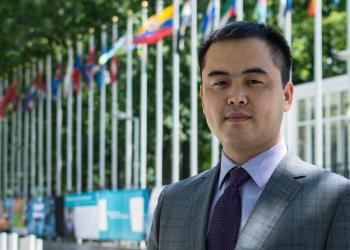Perspective: The Integrative and Disintegrative Forces Propelling Migration
[The following is a reflection offered by Serik Tokbolat, a representative of the Baha'i International Community to the UN, in response to thoughts offered at a breakfast meeting on “Migration and its impact on the implementation of Agenda 2030” held 8 June 2016.]
Although the injustices that plague the world take numerous forms, they stem from a singular cause: pervasive disunity. Migration can be seen as a historical process that has been impelled at different historical moments by different forces, some integrative and others disintegrative.
Displacement, for instance, would seem to be an outcrop of the latter. Entire populations are forced to seek new homes as a result of corrupt systems that fail to protect the most vulnerable, offering unequal access to education, exploiting the masses for the benefit of the few, and neglecting entirely the nurturing of moral capabilities – creating, in effect, the perfect breeding ground for violence and conflict. Naturally, in the midst of this widespread disintegration, people often find themselves fleeing their home countries.
A brighter future, the hope of a better life, and a more stable foundation may likewise call migrants to a new homeland. In fact, there are many social, environmental, political and economic factors that fuel migration.
What cannot be denied is that migration would never be possible on the scale that it is now if many of the age-old prejudices separating groups of people from one another had not already tumbled, and if the technology that eases the process were not in place. These can be considered part of the integrative forces that propel migration today.
From either perspective, as Ms. Roesch stated, migration has been a feature of human life almost from the beginning of time. Indeed, it is an evolutionary process that has been critical to the process of populating vast expanses of the world, allowing for the emergence of new civilizations. There is no reason to believe this process will come to a close in any foreseeable future. Our challenge, then, is to understand its root motives and learn how to channel it sustainably, so that the countries receiving new migrants are not adversely impacted nor the countries losing citizens bereft of key resources.
How can a host country benefit from the fresh insights of citizens who’ve had exposure to different ways of viewing the world and organizing societies? How can resources be cultivated and distributed in such a manner that countries do not face the threat of depletion? What can be done to ensure that the countries losing citizens are not left without a viable workforce? How can universal access to quality education become a reality everywhere, so that the oft-feared ‘brain-drain’ is no longer a legitimate concern? These are some key questions that require our deep reflection as a global community.
A key object of learning over the next several decades will naturally be around the impact of migration on the communities losing and gaining new members. Naturally, as we learn to build more just, prosperous communities characterized by unity in diversity, cooperation and reciprocity, the forces impelling migration will increasingly be the integrative ones, and many of the challenges articulated above will no longer be relevant.
It is also worth noting that the nature of our national borders are artificial and man-made, their shifting nature the result of political trends and social upheavals. Who can predict how borders will be organized in the future?
What we do know now is that the more populations move across countries, the more interdependent our globalized planet becomes. Mr. Hovy stressed the need for the benefits of migration to be addressed by recognizing “that the contributions of migrants and migration, not only in destination countries but also in countries of origin are highly underrepresented.”
Correspondingly, it is important to look at mass migration as a crucial factor in weeding out prejudice over the long term, as people are forced to build communities together. Younger generations begin to intermarry and naturally new generations emerge who care little for the biases of their forebears.
Although many of the challenges regarding sustainable migration are clearly systemic, a vital challenge we must overcome is that of prejudices residing in the human heart. The closer individuals move towards the elimination of all prejudices within their lives, the more unified the global community will become.
We must not simply wait for the systems and structures around us to change – this process of abandoning prejudices is one that must take root in the hearts of us all. As stated by Her Excellency, Mrs. Chartsuwan: “Everyone has a role to play.”
The process of migration, fueled at times by prejudice, will ironically itself provide the means for overcoming those very bigotries which propel it. As people are faced with their common humanity, the othering of human beings that has made possible the exploitation, ruin, and oppression of entire populations will increasingly become a dark and embarrassing chapter of our collective past.
Despite the daunting difficulties, then, this human flow in such huge volume from so many countries to so many others can be regarded as one of the means by which the unity of the human race in all its diversity might be achieved.
-- Serik Tokbolat is a representative of the Baha'i International Community to the United Nations
